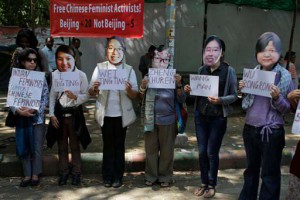 Emily Rauhala / Beijing @emilyrauhala March 19, 2015
Emily Rauhala / Beijing @emilyrauhala March 19, 2015
Altaf Qadri—AP
Indian women’s rights activists wearing masks of five women’s rights activists formally detained in China after Women’s Day crackdown, hold placards with their names, to express their solidarity and demand their immediate release, in New Delhi, India, Wednesday, March 18, 2015
The line between dissidence and social activism grows ever murkier
It was supposed to be a celebration. This year marks two decades since the world came together in Beijing for the Fourth World Conference on Women. Participants in that event — including keynote speaker Hillary Clinton — set an ambitious global blueprint for gender equality and women’s rights. It was a landmark moment for the women’s movement, and a point of pride for China as it stepped, gingerly, toward post-Mao reforms.
But as meetings to mark the “Beijing+20” anniversary close Friday in New York, things are looking bleak. In the run up to International Women’s Day and the Beijing+20-themed conclave, China detained 10 women for planning activities to celebrate the occasion. Five of those women — Wu Rongrong, Wei Tingting, Wang Man, Zheng Churan and Li Tingting — are still in detention. Their lawyers worry they will be charged with “picking quarrels and creating a disturbance,” an Orwellian turn of phrase used to jail government critics.
The ruling Communist Party has long taken aggressive measures to silence opposition voices, censoring the Internet, banning books, and jailing dissidents. For much of the past decade, though, the line between “dissident” and “critical voice” — that is between prison and the freedom to live your life — was, with exceptions, relatively clear: Do not openly oppose one-party rule. Avoid the “three T’s” (Tibet, Taiwan and Tiananmen). Don’t take to the street.
However, since coming to power in 2012, Xi Jinping’s regime has taken an even harder line, jailing those who speak out on matters not related to party control or the three T’s. (See, for example, the case of Professor Ilham Tohti, or jailed lawyer Xu Zhiyong.) There are new no-go areas, including the politics of Xinjiang Uighur Autonomous Region, and calls for government transparency that do not originate from the government itself. Until this month, if you kept a low profile and did not plan protests, you could speak publicly on issues like gender equality and LGBT rights.
Now, advocates fear that too has changed. The women arrested in Beijing this month were not advocating for the overthrow of the Communist Party. In fact, they were, separately, and in their respective cities, simply planning to distribute pamphlets and raise awareness about issues the Chinese government supports: gender equality and combatting sexual harassment. These activists did not organize political rallies, but rather used performance art to challenge societal views.
For detail please visit here
